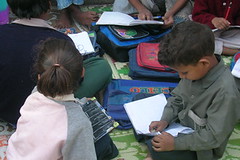These little children sit on a wind swept terrace, on top of a tiny jhuggi overlooking a sea of slum dwellings in India’s capital city. A few days back they use to spend their times, roaming filthy lanes. Copy or slate in hand they wait for today’s lesson. A palpable energy pervades the little rooftop. A quick roll call proves that caste or creed is no bar here, the common denominator is learning!
Now what they will learn depends on the two teachers one a tribal the other a Muslim, an unlikely combination brought together by pwhy! They are willing to imbibe whatever they are taught.
A recent survey in a leading magazine proved that education in India, even if it is imparted in the best school, is way below international standards. What is excels in is learning by rote. Where it fails is in making connections. Hence though a child knows the composition of water, he/she is unable to give the composition of steam as he/she fails to make the link between the two. And the list is endless..
Today education is a number game with percentages rising to unbelievable heights and children cramming knowledge without often comprehending it let alone seeing its relevance in everyday life. I remember taking a class in the early days of pwhy where I asked class VII and VII children to identify one area where percentages played an important role. the lessons was about fractions. needless to say no one came with any answer and they were all surprised when I told them about sales whereby reduction were offered in percentages: 50% off, 20% saving etc.
I have always held that the Delors (UNESCO) four pillars of educations are essential to any sound education programme . They are:
Learning to know: Thinking abilities: such as problem-solving, critical thinking, decision-making, understanding consequences
Learning to be: Personal abilities: such as managing stress and feelings, self-awareness, self-confidence
Learning to live together: Social abilities: such as communication, negotiation, assertiveness, teamwork, empathy
Learning to do: Manual skills: practicing know-how required for work and tasks
Knowledge is useless unless the student has the ability to apply it to everyday situations. That is where our system fails us.
Unlike upmarket children, slum kids tend to start schooling at a much later stage. And unlike their rich counterparts, their living skills are tested at a very early stage. Tiny kids cross busy roads to shop for their mothers, or learn to fight for their rights when they are barely toddlers. I was surprised to see how a young five year old who had never learn arithmetic could account for the money given by his mother. I have seen little girls intuitively knowing what to do to soothe their howling sibling.
These children who by force majeure have to begin life using the 4 pillars we mention, quickly forget them as the enter the gates of a school. There the only thing they are judged is their ability to regurgitate the lesson.
Education is above all the ability to assimilate, analyze and then use the knowledge acquired and a self-respecting system should teach just that.
I will end this post by sharing a personal experience. When I sat for my French baccalaureate the history syllabus was the history from of the world from 1914 to present days. The final exam was summed up in one question: Had the allies lost the war, what in your opinion would have been the present economic scenario? (the year in question was 1967). Even if you had mugged up the entire book you would not have been able to answer the question if you did not have the ability to apply what you had learnt to a given reality. There was no right or wrong answer; you were judged by your ability to defend your opinion.
Therein lies the difference.
Powered by Qumana


